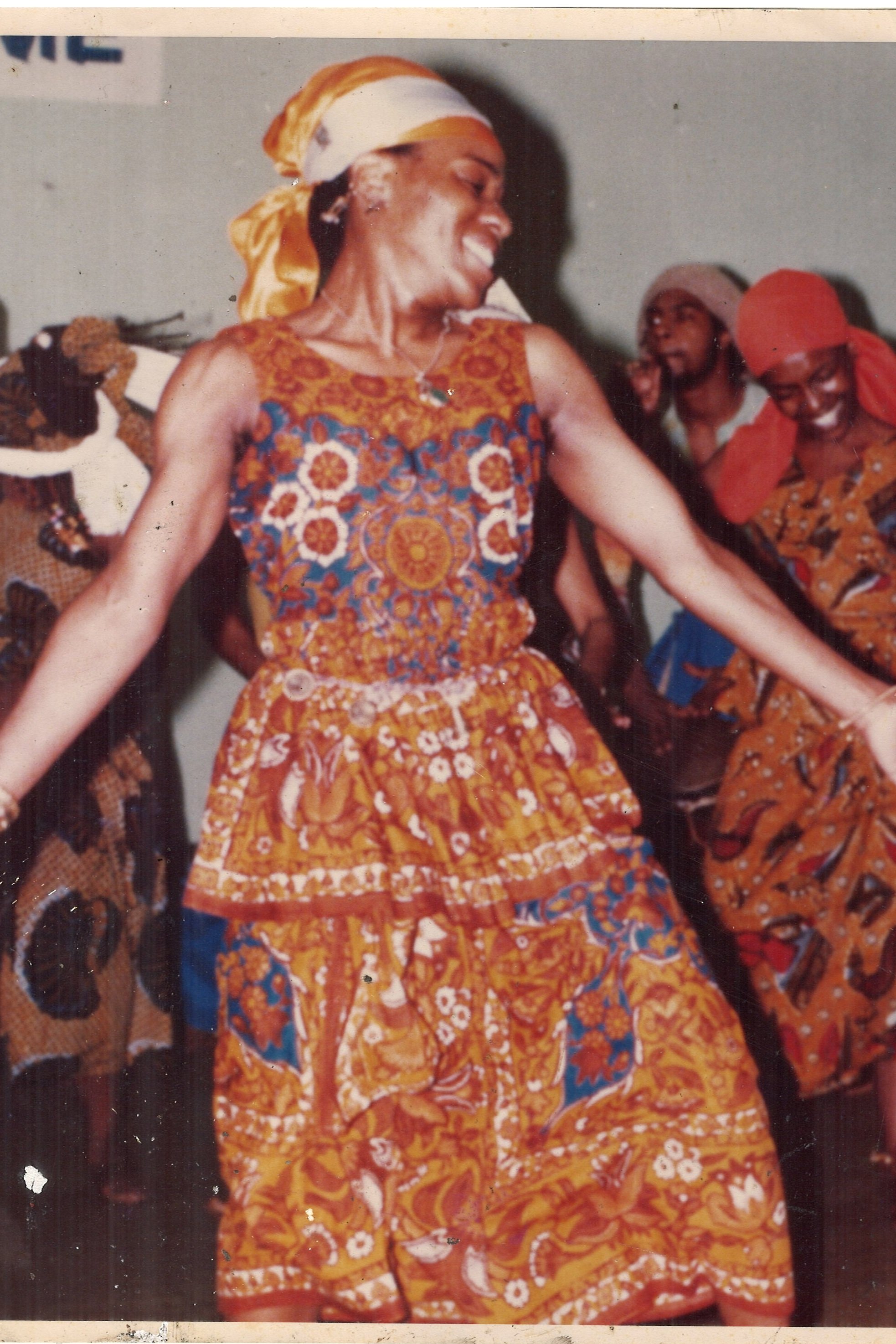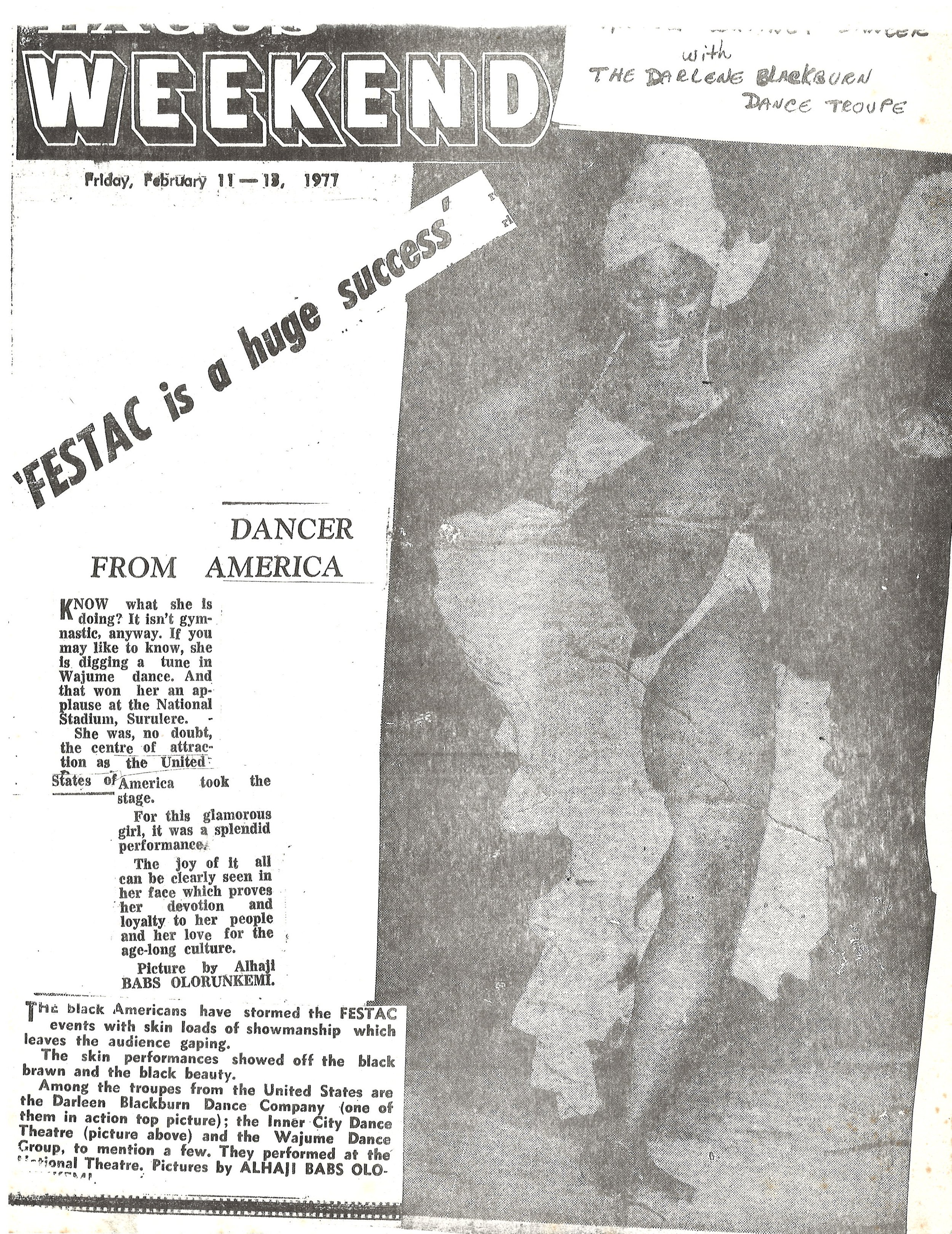Humans of Sweet Water...Meet Mama Aissatou
Mama Aissatou, as she is affectionately known, has been a member of the Sweet Water Family since 2018. She grew up nearby where The Commonwealth is now located and has seen the neighborhood change throughout the years. Every year since she first visited The Commonwealth, Mama Aissatou has grown Jamaican pumpkins on the Residents’ Farm and Community Farm and has recently begun cooking for the team and visitors once a week. Mama Aissatou is also a dancer and performer who has performed in SWF Juneteenth Celebrations. We invite you to read more about Mama Aissatou who is an integral part of the SWF Family.
Tell us about your background
Most people know me as Aissatou Whitney Bey, but depending on when you may have met me, you may know me as Rakel. I was born and raised in Chicago just a few blocks from where The Commonwealth is located now. My grandmother grew up in Alabama and my grandfather grew up in Tennessee. My grandfather always grew food. If there was a vacant lot on his block, which there always was, he grew on it! He grew everything - tomatoes, peppers, greens, bell peppers, peas, cabbage, and greens. I have four children, two sons and two daughters.
I am also a trained performer. I started performing as a dancer and musician when I was about 17 years old. I met a drummer one day that I used to pick up from the South Side Community Art Center on 39th Street. Sometimes, I had to stand around for a few minutes and wait for them to finish, and after some time, Darlene Blackburn, who was one of the first African American dancers in Chicago, invited me to take a dance class for free. Her forte was African dance among other styles. After a few dance classes she said, “Oh, you're pretty good at this! Would you like to be part of my dance company?” I was so excited, so of course I said, “yes”! That was back in 1976 and that's how I got involved with dancing as well as African Culture!
After one year of performing at some colleges and other artsy places in Chicago, the Second World Festival of African Arts and Culture (FESTAC) was to be held in Nigeria, West Africa. Everything was built specifically for this festival - the theaters for the performances, the housing, etc! All the great names in African American arts and throughout the world or diaspora were there.
Most of the performers had already been selected to go, but I was able to audition and I was picked as funding became limited. Only the best were selected to represent Africans in America! I was about 19 at that point. That was my first trip to Africa and it lasted about two weeks. During the festival, a photo capturing me performing “Calypso” appeared on the entire front page of a major Nigerian newspaper. In addition, Ebony Newspaper produced a “Special Edition” of FESTAC where I also appeared.
I began dancing with Muntu Dance Company in 1978 and I was a principal dancer with them for more than 40 years, training, teaching, and traveling around the world performing.
Another transition on my journey was to return to school where I majored in Biological Sciences. At Malcolm X College, Chicago State University, and ultimately earning a Bachelors Degree in Medical Laboratory Science from Northern Illinois University in DeKalb, IL.
I trained at Cook County Hospital, OSF Little Company of Mary, and Lurie Children’s Hospital of Chicago.
How did you find out about Sweet Water Foundation?
As I mentioned, I was born and raised a few blocks away from where Sweet Water Foundation is located. When I was growing up, this area was full of businesses - gift shops, a barbecue restaurant, a candle shop, candy shops, chicken shacks, a funeral home, grocery stores, and a barber shop to name a few. I’ve seen this community go through a lot. There are only a few of those businesses and houses standing here now. It’s desolate now compared to when I was growing up.
One day back in 2018, I was passing by The Commonwealth, and saw the Community Garden. I figured it must have been owned by some European people. I came back again to check it out, and realized this was more than just some little plants growing, this is a serious operation! The third time I stopped by, I saw Emmanuel and started talking with him about Sweet Water Foundation and The Commonwealth. That is how I first found out about Sweet Water Foundation.
What are some of the things you do here at The Commonwealth?
I have done a few things with Sweet Water Foundation since I first started coming here. I have been growing Jamaican pumpkins since 2018. This variety of pumpkin is not indigenous to Chicago, so some years have been more successful than others. I also grew hibiscus here one year which is very popular in the islands, Africa, and Mexico.
I have performed in the Thought Barn during the Annual Juneteenth Celebrations, as well as a vendor here during Juneteenth and at some Friday Markets. I sell a lot of different hair and skin products, fragrance oils, incense, deodorant, toothpaste, shampoo, conditioner, clothes, etc.
More recently, I have been cooking every Wednesday at The Commonwealth with Ali, who is one of SWF’s Global Fellows. We cook for the people who are onsite that day - whether that be the SWF Core Team, volunteers, or neighbors. I really enjoy cooking! I especially enjoy cooking more natural and less processed food.
The most important thing to me that I have been doing here is introducing people to the commonwealth space. Many have even said they have made contributions and donations and expressed THEIR pride about what is going on here!
Can you share more about the pumpkins you grow here at The Commonwealth?
I have been going to Jamaica every year for a very long time. The last time I went to Jamaica before I saw Sweet Water Foundation, a friend of mine had me help him plant pumpkins. He showed me how they really plant pumpkin in Jamaica. We cleared the land first and then began planting. They put more than one seed in the hole - several different types of seeds in one hole.
In Jamaica, they grow pumpkins because they are a food staple. Pumpkins are plentiful there and most of the people on the islands grow their own pumpkin and whatever else they eat. They don’t just call it pumpkin - they call it “food”. If you go to a restaurant and you order something to eat, you may say, “I want brown stew snapper with ‘food’”. They already know you mean green banana, pumpkin, and white yam. Pumpkin is also used in rice dishes and drinks like coconut, carrot, pumpkin juice.
The pumpkins are so pretty and they are very nutritious! They are low in calories, but rich in nutrients. There is no fat or cholesterol in them. They have potassium, fiber, proteins, calcium, vitamins C, A, & B6, iron, and magnesium. Pumpkins are also vital to support a healthy immune system. The seeds are good for the prostate, improve sperm quality, and regulate blood pressure and blood sugar.
I have planted pumpkin at Sweet Water Foundation for the past few years. Some years have been more successful than others, but I am happy to have a place to grow them!
What does a place like Sweet Water Foundation mean to you?
I read the We The Publics Manifesto and I think, “This is everything... we don't need any more than that.” I want to share the manifesto with some other farmers in other places like Jamaica. They are really into farming, but they need to expand their ideas and approach for what they do and how they do it. That’s what I really like here and what I saw when I first came here. I like that Sweet Water Foundation keeps evolving! If someone has an idea or wants to manifest something good or beneficial for the community or humanity, the space is open to plant those seeds!
I like the camaraderie here, the openness, and the exchange and sharing. I love seeing young people here with the more mature people. This is what we need to be doing. Something like Sweet Water Foundation should be in every community.
Is there anything else you would like to share?
I have been involved in activism in the community, Chicago, and throughout Illinois. I’ve also studied martial arts, and healing art forms, and do massage therapy.





